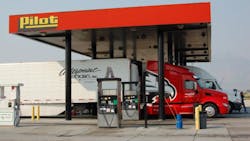Diesel and gasoline prices in the U.S. continued declining this week, according to data tracked by the Energy Information Agency (EIA), falling 3.7 cents and 8.4 cents per gallon, respectively.
The EIA said the U.S. average for diesel fell to $2.445 per gallon this week, which is $1.183 per gallon cheaper compared to the same week in 2014.
Diesel prices fell in every region of the country, the agency noted, decreasing the most in the Midwest (down 5.3 cents per gallon) followed by the West Coast with California excluded (down 4.7 cents; with California included, prices dropped only 4.2 cents per gallon).
The lower Atlantic and Midwest sported the cheapest per-gallon prices for diesel in the U.S. this week at $2.37 and $2.441 per gallon, respectively, with California the highest at $2.733 per gallon.
The EIA noted that not only did the U.S. national average for gasoline continue falling this week – dropping 8.4 cents to $2.094 per gallon, which is 72.7 cents per gallon cheaper compared to the same week last year – but in every region of the country as well.
The Midwest reported the biggest decline at 15 cents per gallon, with the Gulf Coast and the Midwest not only home to the cheapest per-gallon prices for gasoline but also the only ones under the $2 per gallon mark: $1.854 and $1.933, respectively.
Meanwhile, in a separate report, the EIA noted that the transportation of people and goods now accounts for about 2In fact, the EIA’s data indicates light-duty vehicles alone now consume more than all freight modes of transportation, such as heavy trucks, marine, and rail.
The agency added that the U.S. was the world's largest transportation energy consumer in 2012, the most recent year with detailed international transportation data by mode, consuming 13 million barrels of oil equivalent per day (b/d) and representing 25% of global transportation energy demand that year.
EIA added that the U.S., major European countries – those in the Organization for Economic Cooperation and Development or OECD – and China together now represent more than 50% of world transportation energy consumption.
However, in contrast to both the U.S. and OECD Europe, on-road transportation energy use in China more heavily reflects freight movement instead of passenger travel, the agency said
EIA also noted that global transportation energy consumption remains is dominated by two fuels: motor gasoline (including ethanol blends) and diesel (including biodiesel blends). Together, these two fuels accounted for 77% of total transportation consumption in 2012.
By contrast, non-petroleum fuels account for very small portions of the world energy mix, with natural gas and electricity each accounting for about 1% of total transportation energy, the agency said.
About the Author
Sean Kilcarr
Editor in Chief
Sean Kilcarr is a former longtime FleetOwner senior editor who wrote for the publication from 2000 to 2018. He served as editor-in-chief from 2017 to 2018.

